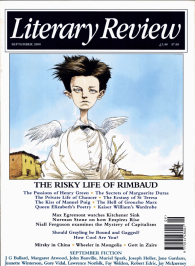Andrew Biswell
Fair Question
A Clue To The Exit
By Edward St Aubyn
Chatto & Windus 197pp £12.99
This is a first-person, mock-confessional novel, the autobiography of Charlie Fairburn, a successful screenwriter who is given a few months to live by his doctors. He decides that he must write something worth while, a novel that will be his legacy to the world. Leaving his daughter and ex-wife behind, he sells his house and takes the money to Monte Carlo, where he tries to gamble away millions of francs in the odd moments when he is not working on his literary masterpiece – which is set on a train, and is to be called On the Train.
In a casino, Charlie meets Angelique, a gambling addict who cannot stop herself jumping into bed with him. The only possible explanation is that she is mysteriously turned on by male self-pity, as is often the case with heroines in this sort of book. Charlie and Angelique are soon at

Sign Up to our newsletter
Receive free articles, highlights from the archive, news, details of prizes, and much more.@Lit_Review
Follow Literary Review on Twitter
Twitter Feed
It wasn’t until 1825 that Pepys’s diary became available for the first time. How it was eventually decrypted and published is a story of subterfuge and duplicity.
Kate Loveman tells the tale.
Kate Loveman - Publishing Pepys
Kate Loveman: Publishing Pepys
literaryreview.co.uk
Arthur Christopher Benson was a pillar of the Edwardian establishment. He was supremely well connected. As his newly published diaries reveal, he was also riotously indiscreet.
Piers Brendon compares Benson’s journals to others from the 20th century.
Piers Brendon - Land of Dopes & Tories
Piers Brendon: Land of Dopes & Tories - The Benson Diaries: Selections from the Diary of Arthur Christopher Benson by Eamon Duffy & Ronald Hyam (edd)
literaryreview.co.uk
Of the siblings Gwen and Augustus John, it is Augustus who has commanded most attention from collectors and connoisseurs.
Was he really the finer artist, asks Tanya Harrod, or is it time Gwen emerged from her brother’s shadow?
Tanya Harrod - Cut from the Same Canvas
Tanya Harrod: Cut from the Same Canvas - Artists, Siblings, Visionaries: The Lives and Loves of Gwen and Augustus John by Judith Mackrell
literaryreview.co.uk